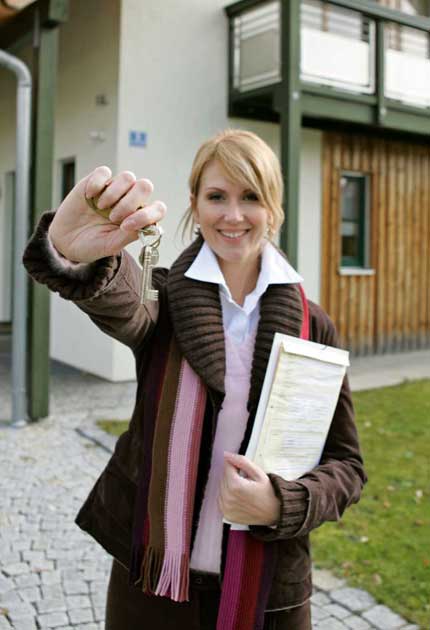Recession spells end for 'traditional' estate agency
Selling your home is tougher than ever but property professionals have new tricks to close the deal. Graham Norwood reports

Whisper it, but the 2008 housing slowdown may have an unexpected benefit. It may drag estate agents, their arcane processes and their fees into the 21st century. Something certainly needs to be done. The Royal Institution of Chartered Surveyors says the business of typical "old-style" estate agents has hit a 30-year low, selling an average of just one home a week. Property auctions have hitherto been regarded as a sure-fire way of getting rid of homes that are difficult to shift, but one in south Wales last month involved 74 lots of homes and land – and received just three bids and no sales.
While desperate vendors are now adopting wacky tactics, from staging raffles to throwing in free cars or holidays with their homes, a few pioneering estate agents are considering revolutionising the way they sell our properties in a recession. Lauristons estate agency in London is now charging a £999 flat fee for selling a home instead of the 2 per cent to 3 per cent charged by most of its high-street rivals, saving prospective sellers of average-priced properties as much as £8,000.
"The market's changing and the current economic climate means it probably won't be the same in the future," warns the firm's sales and marketing director Steve Truman, who says estate agents should join the majority of other professionals in charging an up-front fee instead of working on a commission basis.
In the North-west of England Thornley Groves, a "traditional" estate agency chain, has bought 25 per cent of Brightsale, a pioneering online estate agency. Brightsale is not a free-to-use website that leaves viewings and sales negotiations to sellers, but calls itself a "proper" estate agency – it simply has no physical "branch". Its trained negotiators instead advise sellers on how to handle buyers, and will arrange floor plans, photographs and brochures. The fee, if a home sells, is 0.5 per cent, or only a sixth of the levy by many conventional agents.
Many property analysts think high-street agents will have to adopt a similar business model after a recession in which many sellers may have "done it themselves" to save fees – in which case, Thornley Groves is at the start of something big. "We'd been searching for a way to bring estate agency into the 21st century. Clients love what we do but in the internet era they expect more. Estate agency has a long way to go to harness the power of the internet for the benefit of its customers," says Thornley Groves' managing director Michael Groves.
In Southport two estate agents are trying a different idea – swapping houses. Lynn Thompson and Chris Tinsley run separate conventional agencies but have joined forces to try to "match" sellers, who are encouraged to swap properties of equal value, or trade up or down and pay the difference. The lettings business is transforming itself too. Rental property site www.upad.co.uk puts prospective tenants directly in touch with landlords. Landlords pay once and their property remains listed until it has a tenant.
While some of these pioneering efforts may fall by the wayside when the housing market picks up – business consultancies and agents themselves suggest 2010 as the earliest date that will happen – at least a few of these schemes may last long enough to become mainstream as house selling changes through the recession. This month, business consultancy Key Note published a report on how agents operate, with gloomy predictions on their future.
"The market has been on a roll for 13 years and a sizeable proportion of estate agency staff have not worked in conditions as difficult as those they are now facing. Many may lack the experience required to survive," its report says. "The market as we know it today may not exist in 10 years' time," it warns, predicting that the internet and sellers themselves will play bigger roles in selling homes. Fees are expected to fall too – at least one silver lining to the dark days of the credit crunch.
Estate of the nation: Sellers feeling the pinch
* Up to 15,000 estate agents will lose their jobs by the end of 2009, predicts the Centre for Economic and Business Research think-tank.
* Fewer than 10 per cent of estate agencies have lettings departments – the one sector of the property market that has performed well in 2008.
* Estate agents are threatening to pull advertisements from sales website Rightmove and set up their own free-to-advertise website.
* One top-end agency, Hamptons International, is offering £5,000 to anyone who introduces a client to them who then buys a home overseas.
* Since the summer, four estate agents' branches have shut on Worle High Street, Weston-super-Mare – the most in any single UK street.
* Property developer Gary McCausland will host a BBC show in the new year, challenging vendors to sell their homes quicker than an estate agent.
Join our commenting forum
Join thought-provoking conversations, follow other Independent readers and see their replies
Comments
Bookmark popover
Removed from bookmarks